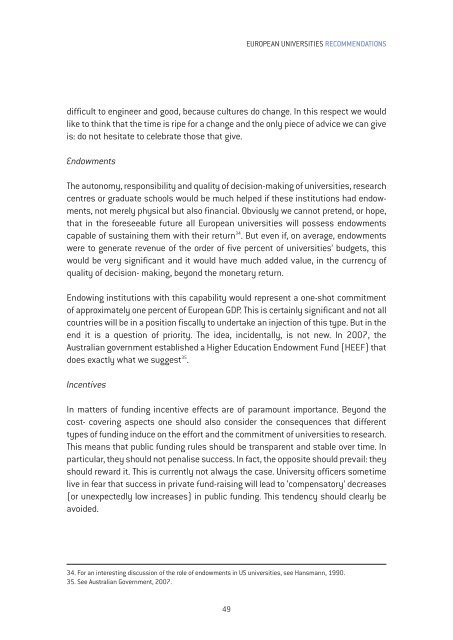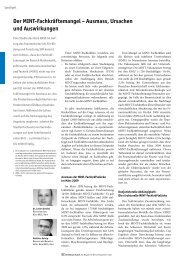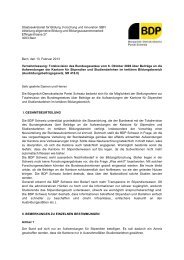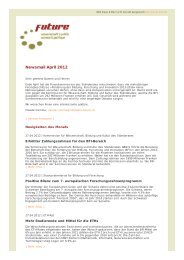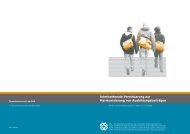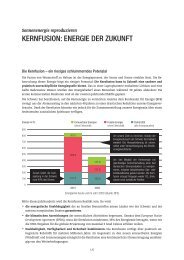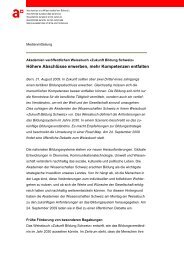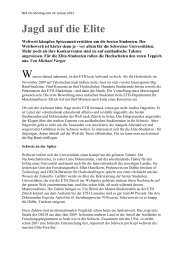Higher aspirations: an agenda for reforming European universities
Higher aspirations: an agenda for reforming European universities
Higher aspirations: an agenda for reforming European universities
You also want an ePaper? Increase the reach of your titles
YUMPU automatically turns print PDFs into web optimized ePapers that Google loves.
EUROPEAN UNIVERSITIES RECOMMENDATIONS<br />
difficult to engineer <strong>an</strong>d good, because cultures do ch<strong>an</strong>ge. In this respect we would<br />
like to think that the time is ripe <strong>for</strong> a ch<strong>an</strong>ge <strong>an</strong>d the only piece of advice we c<strong>an</strong> give<br />
is: do not hesitate to celebrate those that give.<br />
Endowments<br />
The autonomy, responsibility <strong>an</strong>d quality of decision-making of <strong>universities</strong>, research<br />
centres or graduate schools would be much helped if these institutions had endowments,<br />
not merely physical but also fin<strong>an</strong>cial. Obviously we c<strong>an</strong>not pretend, or hope,<br />
that in the <strong>for</strong>eseeable future all Europe<strong>an</strong> <strong>universities</strong> will possess endowments<br />
capable of sustaining them with their return 34 . But even if, on average, endowments<br />
were to generate revenue of the order of five percent of <strong>universities</strong>’ budgets, this<br />
would be very signific<strong>an</strong>t <strong>an</strong>d it would have much added value, in the currency of<br />
quality of decision- making, beyond the monetary return.<br />
Endowing institutions with this capability would represent a one-shot commitment<br />
of approximately one percent of Europe<strong>an</strong> GDP. This is certainly signific<strong>an</strong>t <strong>an</strong>d not all<br />
countries will be in a position fiscally to undertake <strong>an</strong> injection of this type. But in the<br />
end it is a question of priority. The idea, incidentally, is not new. In 2007, the<br />
Australi<strong>an</strong> government established a <strong>Higher</strong> Education Endowment Fund (HEEF) that<br />
does exactly what we suggest 35 .<br />
Incentives<br />
In matters of funding incentive effects are of paramount import<strong>an</strong>ce. Beyond the<br />
cost- covering aspects one should also consider the consequences that different<br />
types of funding induce on the ef<strong>for</strong>t <strong>an</strong>d the commitment of <strong>universities</strong> to research.<br />
This me<strong>an</strong>s that public funding rules should be tr<strong>an</strong>sparent <strong>an</strong>d stable over time. In<br />
particular, they should not penalise success. In fact, the opposite should prevail: they<br />
should reward it. This is currently not always the case. University officers sometime<br />
live in fear that success in private fund-raising will lead to ‘compensatory’ decreases<br />
(or unexpectedly low increases) in public funding. This tendency should clearly be<br />
avoided.<br />
34. For <strong>an</strong> interesting discussion of the role of endowments in US <strong>universities</strong>, see H<strong>an</strong>sm<strong>an</strong>n, 1990.<br />
35. See Australi<strong>an</strong> Government, 2007.<br />
49


